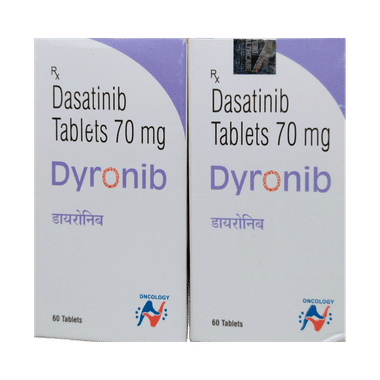-
Daslemia 70 Tablet (Rs.4682.81)
Composition: Dasatinib (70mg)
-
Dasatrue 70mg Tablet (Rs.8765.62)
Composition: Dasatinib (70mg)
-
Beedan 70mg Tablet (Rs.13650)
Composition: Dasatinib (70mg)
-
Spnib 70mg Tablet (Rs.10000.2)
Composition: Dasatinib (70mg)
All Details About Dyronib 70mg Tablet
Find out detailed description, uses, directions of use, side effects, warnings and precautions, frequently asked questions about Dyronib 70mg Tablet
Description:
Dyronib 70mg Tablet is used in the treatment of blood cancer (chronic myeloid leukaemia). It is used in patients whose disease could not be treated with other medications for leukaemia or who cannot take these medications because of side effects.Dyronib 70mg Tablet can be taken with or without food, but try to have it at the same time every day to get the most benefits. Your doctor will decide what dose is necessary and how often you need to take it. This will depend on what you are being treated for and may change from time to time. You should take it exactly as your doctor has advised. Taking it in the wrong way or taking too much can cause very serious side effects. It may take several weeks or months for you to see or feel the benefits but do not stop taking it unless your doctor tells you to.
Nausea, vomiting, abdominal pain and rash are some common side effects of this medicine. In some cases, it may cause increased heartbeat and low or high blood pressure, if it happens consult with your doctor. Your doctor might check your blood pressure regularly. It is advised to avoid antacid intake within 2 hours of taking this medicine. This medicine may reduce the number of blood cells in your blood, thereby, increasing the susceptibility to infections. Regular blood tests are required to check your blood cells.
Many other medicines can affect, or be affected by, this medicine so let your healthcare team know all medications you are using. This medicine is not recommended during pregnancy or while breastfeeding. You must avoid driving if you experience dizziness or blurred vision during treatment.
Directions For Use:
Dyronib 70mg Tablet is an anti-cancer medication. It works by blocking the action of the abnormal protein that signals cancer cells to multiply. This helps to stop or slow the spread of cancer cells.Side Effects:
Ordinary side effects of Dyronib
- Nausea
- Constipation
- Anemia (low number of red blood cells)
- Rash
- Vomiting
- Chubbyigue
- Infection
- Diarrhea
- Musculoskeletal (bone, muscle or joint) pain
- Low blood platelets
- Muscle pain
- Joint pain
- Headache
- Abdominal pain
- Fluid retention
- Pleural effusion
- Localized edema
- Pulmonary hypertension (high blood pressure)
- Generalized edema
- Pericardial effusion
- Heart failure
- Pulmonary edema
- Hemorrhage
- Gastrointestinal bleeding
- Muscle spasm
- Itching
- Decreased white blood cell count (neutrophils)
- Decreased phosphate level in blood
- Decreased calcium level in blood
- Increased bilirubin in the blood
- Increased creatinine level in blood
- Nausea
- Constipation
- Anemia (low number of red blood cells)
- Rash
- Vomiting
- Chubbyigue
- Infection
- Diarrhea
- Musculoskeletal (bone, muscle or joint) pain
- Low blood platelets
- Muscle pain
- Joint pain
- Headache
- Abdominal pain
- Fluid retention
- Pleural effusion
- Localized edema
- Pulmonary hypertension (high blood pressure)
- Generalized edema
- Pericardial effusion
- Heart failure
- Pulmonary edema
- Hemorrhage
- Gastrointestinal bleeding
- Muscle spasm
- Itching
- Decreased white blood cell count (neutrophils)
- Decreased phosphate level in blood
- Decreased calcium level in blood
- Increased bilirubin in the blood
- Increased creatinine level in blood
Warning & Precautions:
It is not known whether it is safe to consume alcohol with Dyronib 70mg Tablet. Please consult your doctor.FAQs:
What is Dyronib 70mg Tablet used for?
Can Dyronib 70mg Tablet cause severe lung issues?
Are there any heart-related risks with Dyronib 70mg Tablet?
What are the risks of Dyronib 70mg Tablet for my liver?
Can Dyronib 70mg Tablet cause any bleeding issues?
Is there any risk to my fertility with Dyronib 70mg Tablet?
Can Dyronib 70mg Tablet cause infections?
Written by:
Dr. T. Sharmila Krishna
M.B.B.S., MD (Biochemistry)
Reviewed by:
Dr. Sureshbabu Yadav
M.B.B.S., DIP.DIAB, F.R.S.H
Disclaimer:
Getomeds primary intention is to ensure that its consumers get information that is reviewed by experts, accurate, and trustworthy. The information and contents of this website are for informational purposes only. They are not intended to be a substitute for professional medical advice, diagnosis, or treatment. Please seek the advice of your doctor and discuss all of your concerns about any disease or medication. Do not disregard or postpone seeking professional medical advice because of something you read on Getomeds. Our mission is to support, not replace, the doctor-patient relationship.
